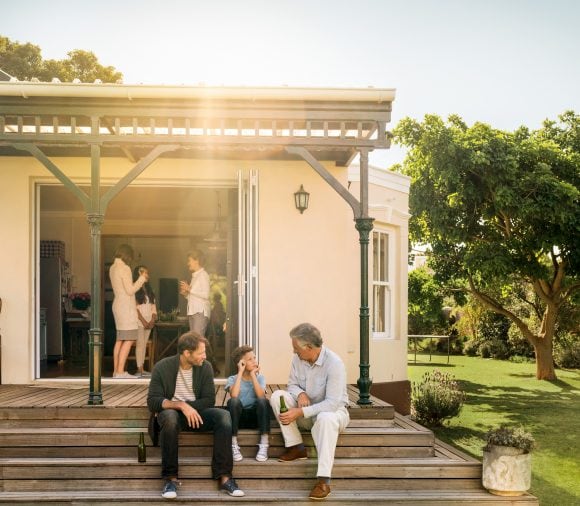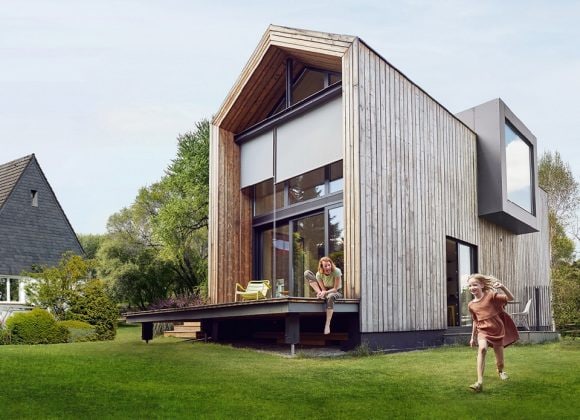Avoid unpleasant surprises Home purchase checklist: key information at a glance
Pre-purchase considerations, choosing a property, financing and completing the sale: our checklist will ensure nothing is forgotten!
Content:
Content:
- Check the location, neighborhood and infrastructure.
- Examine the property thoroughly and make a list of any defects.
- Be cautious regarding reservation contracts and advance payments.
- Before buying, make sure you have read and understood every detail of the contract.
- To the conclusion

As well as realizing the dream of owning your own home, the decision to purchase a house or an apartment is also an important way of providing for your retirement.
Our checklist covers the most important things you should consider when buying a home: financing, choice of property and location.
Whether buying a property is worthwhile depends heavily on the market environment. Two factors are decisive: the level of interest rates and real estate prices. When interest rates are low, buyers can more easily afford the larger mortgages that come with high real estate prices. Conversely, buying a property when interest rates are high can still make sense, provided it is comparatively cheap.
Find out in detail what costs you will incur when buying a home, your financing options and which expenses are tax-deductible.
If you plan on taking out a mortgage, you should have at least 20% of the purchase price as equity. A financial cushion to cover unexpected expenses is also recommended.
Certain costs, e.g., for insurance, maintenance and renovation work, are tax-deductible. With good planning and the right financing, there is nothing to stop you buying a home. Our checklist will help you consider all the key aspects.
Finding the right property for you
Finding the right property for you
When looking for a suitable home, you should ask yourself the following questions: How big does the house or apartment need to be? How many rooms and how much total space do you need? Is there a place to park your car or motorcycle? Would you like to have a garden? Do you want to live in the city center, the suburbs or in the countryside? What sort of infrastructure is available at your preferred location? Are there stores and schools nearby? And what about healthcare?
Property location
Location is one of the most important criteria when purchasing a property. It determines not just the price but whether it will increase in value in future. Find out exactly about the location, infrastructure and neighborhood.
Infrastructure
How important is proximity to the center, distance to stores, the nearest bus stop or playground?
Neighborhood
Who lives in the neighborhood? Families with children or mainly older people? Think about how important the neighborhood is to you and clarify in advance whether you would feel happy and safe there.
Choice of municipality
Have you already thought about what it would be like to live in the new municipality? Before moving, check for tax implications as well as other factors such as the age and income distribution of the population and the unemployment rate. You can also find out in advance what clubs and associations exist in the area.

The facts about your preferred municipality
The facts about your preferred municipality
Do you want to understand how property prices or population levels have changed in a municipality? Or how the location is perceived in general? How high are taxes? The UBS municipality guide is free of charge and answers all your questions.
Condition and renovation
In what condition is the property? What renovation work will you need to carry out and which rooms will need to be refurbished at some point? If you want to buy an older house, you should work out the renovation costs first and clarify how you can save on taxes in the process.
Check documents and contractors
Especially if the desired property is still being built, you must check that the contractors are trustworthy. You should make sure you know what your rights are in the event of construction defects. Contractually agree that any defects will be remedied promptly by the relevant company. Read through all the important documents carefully and have them checked by a professional if necessary. These include the purchase contract as well as the building description, floor plans and, in the case of a condominium, all of the documents relating to condominium ownership.
What do I need to watch out for when viewing a house?
What do I need to watch out for when viewing a house?
- When was it built?
- When were the last renovations carried out on the building (not just in the apartment)?
- What condition are the facade, stairwells and cellars in?
- How weather-tight are the doors and windows?
- How good is the insulation?
- Is the roof weatherproof?
- How modern is the heating system?
- Are there any signs of damp or mold?
- Are there any cracks?
- Could the building contain hazardous substances like asbestos?
- What is the electrical installation like?
- What are the bathrooms like?
- What potential sources of noise are there?
- How sunny or dark is the property?
- Ask to see the building energy certificate issued by the canton (GEAK), if available.
Financing the purchase
Financing the purchase
Additional costs when buying a property
When buying a property, the ancillary purchase costs must be taken into account, in addition to the actual purchase price. These costs can vary considerably, depending on the canton. You should estimate in advance what amounts will be incurred for notary fees, property transfer taxes, land registry fees and, if applicable, brokerage fees.
How much will my mortgage cost?
How much will my mortgage cost?
With the mortgage calculator, you can easily and quickly find out whether you can afford your dream property.
Purchase contracts: what you need to know
Purchase contracts: what you need to know
The purchase contract for a property must be notarized. As a rule, the notary also draws up the contracts and sends them to the buyer and seller. Any changes should first be discussed with the seller before going to the notary, as changes made at this stage will incur costs. Of course, you should read the contract carefully and seek advice if you do not understand certain regulations.
Reservation or preliminary contracts – in which buyers and sellers agree the details of the sale – are increasingly common. However, these are not legally binding, as land purchases in Switzerland must be notarized.
Reservation agreements often require the buyer to make advance payments. If the purchase should fall through, it can be difficult to get a full refund on such payments.
Important points about purchase contracts
- Real estate purchases must be notarized.
- Reservation and preliminary contracts are not legally binding.
- Advance payments are often not refunded in full if the purchase falls through.
- Read contracts carefully and, if necessary, have them explained.
- Ensure the details on payment deadlines and transfer of ownership are clear.
- If a realtor is involved, the rules governing their commission should be clearly agreed.
Finalizing the purchase: final steps and move-in
Finalizing the purchase: final steps and move-in
What happens after signing the contract? Payment is usually made immediately after the contract has been signed before the notary. The keys are also handed over at this stage. The purchase is completed as soon as the transfer of ownership is recorded in the land registry. This is also handled by the notary.
Once the keys have been handed over, there’s now nothing to stop you moving into your new home. Before doing so, you should first inspect it carefully and record its condition and any defects. Check in particular whether anything has changed since you viewed it. Should you discover any deliberately concealed defects, seek legal advice immediately. Although the seller is liable for any defects for two years, you should act quickly because of the burden of proof. You can demand they remedy the problem; theoretically, a reduction in the purchase price is also possible. Canceling the purchase is only rarely possible and in extreme cases.

What’s next for mortgage interest rates?
What’s next for mortgage interest rates?
Our interest rate forecast gives you information each month on current interest rates and interest rate trends – free of charge by email.
Curated monthly by mortgage experts
Free, unsubscribe at any time
Checklist for buying a house – what do you need to watch out for?
Checklist for buying a house – what do you need to watch out for?
Financing rules
- Ensure that you have at least 20% equity available for the financing.
- Keep money in reserve for unexpected expenses.
- Review your asset and income situation.
- Draw up a financing plan and check whether you can afford to buy and maintain the property.
- Don’t forget that maintenance and renovation work is tax-deductible.
- Check all documents and contractors carefully.
Choice of real estate
- How large should the property be?
- What sort of equipment and fittings should it have?
- Ensure that the property location meets your needs.
- Have the real estate valued and check whether it offers good value for money.
For many people, buying a home is the most important financial decision of their lives. To reduce risks and prevent unpleasant surprises, you should think through every step carefully. When viewing the property, pay particular attention to construction defects that could cost you dearly further down the line. Study the purchase contract in detail and don’t be afraid to have any unclear passages explained to you. Also check the financial situation and trustworthiness of your contractors, especially if the property has not been built yet.
With the help of our checklist and thorough research on the subject of buying a house, there is now nothing to stand between you and your dream of owning your own home.

- Personalized advice
- Fast turnaround times for financial confirmations
- You decide on how you would like to receive expert advice - whether by video call from home or in one of our branches

